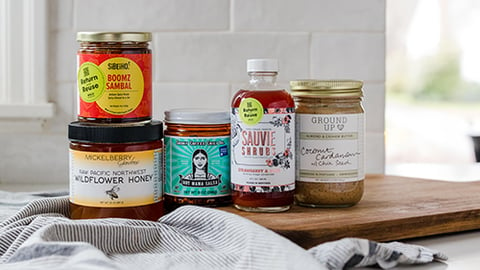How Grocery Retailers Can Ensure Food Safety and Sustainability in Organic Food Packaging
Research shows 82% of American households buy organic products, and that the U.S. organic food market size will grow at a CAGR of 10% from 2020 to 2025. These statistics are a testament to the increasing popularity of organic food, and that more people are turning to organic as a healthier and more sustainable option. When it comes to organic packaging, retailers must maintain the highest standards and keep their products safe for customers.
Regulation Requirements
Retailers planning to stock organic food must ensure that the packaging meets the necessary requirements for the safety of their consumers. They must prioritize stocking materials that have been certified by reputable organizations and ensure that materials and processes meet the specific USDA requirements to be eligible for organic labeling.
[Read more: "Sustainable Packaging Sees Improvements in Functionality"]
Additionally, packaging materials and techniques must coincide with organic food content and handling requirements every step of the way. For example, only preservatives and additives on the National List of Allowed and Prohibited Substances can be used for coloring, preserving or flavoring organic foods, and many of those only in specific ways.
Packaging materials may not contain or have contact with any preservatives or fungicides, fumigants and other pest control compounds that are not on the allowable-substances list. Retailers will need to regularly audit your supply chain and changes in stock materials to ensure compliance.
They must source options like compostable plastics, paper and plant-based fibers that can break down naturally without harmful residues. When possible, they should choose glass or metal containers that are highly recyclable and inert, minimizing chemical interactions with the packaged product.
Collaborating closely with organic food suppliers can provide a whole host of benefits, including enhanced packaging designs and practices to identify opportunities for improvement in both sustainability and food safety.
For example, Costco is always looking at innovative ways to ensure a high-quality supply, and past reports have noted that the company is working on an ongoing basis with farmers to help them buy land and equipment to grow organic food offerings.
Labeling, Traceability and Transparency
Organic food packaging labels should provide consumers with accurate and transparent information about the product’s organic status and its attributes. Retailers should check that stocked items prominently show that they are “Organic” or “Certified Organic” on the front of the packaging. Additionally, packaging should clearly display the logo or seal of the organic certification body that has verified the product’s compliance with organic standards.
Guidance on how to use and store the organic product properly can be useful to consumers, as some items may require different storage solutions from non-organic products to maintain their quality and safety.
The traceability of organic products also involves implementing proper handling and storage of the products when they reach a retailer’s premises. It’s important to train employees on proper handling and storage of organic food products to prevent contamination. Retailers will also need to follow specific guidelines for temperature control and storage conditions to maintain optimal food safety.
Retailers should showcase their commitment to organic products by being transparent about their work through increased in-house marketing and branding efforts. Why shouldn’t they share the stories of local farmers and suppliers that produce their organic products? Consumers often appreciate knowing where their food comes from and the people behind it.
Retailers should also publish regular content on their websites or blogs related to organic living, healthy eating and sustainable living, and use in-store signage, displays and labels to clearly identify and promote organic products.
Retailers can even offer in-store tastings and cooking demonstrations to let customers experience the products and capitalize on seasonal trends and holidays to create special promotions in relation to their organic products.
Sustainability
Faced with a rising tide of plastic waste, the Canadian federal government is pursuing a plan to get supermarkets to cut down on their use of plastic packaging — a measure that could mean big changes to the shopping experience. Ottawa has already revealed that it’s introducing a policy to require Canada’s largest supermarket chains to develop and roll out plans to cut their plastic waste footprint.
In Canada and the United States, some major grocery chains have already started moving away from these forms of plastic packaging by choosing alternatives like glass jars for products, which can be returned, cleaned and refilled.
Using unbleached or recycled paper packaging is another easy-to-adopt sustainable option that companies are embracing. For example, molded pulp trays made from recycled paper or agricultural waste offer cushioning and protection for delicate produce like berries or eggs.
Retailers are also starting to look at other alternative options as the search for more sustainable solutions increases. Some are experimenting with a bring-your-own-container model or offering shoppers products in plastic or glass packaging that, once emptied and cleaned, could be returned for reuse.
To ensure successful integration of sustainability, retailers can even prioritize working with local suppliers to reduce emissions, or those committed to specific sustainability practices by, for example, only using suppliers with reusable packaging for their products, helping to create a more ethical supply chain overall.






